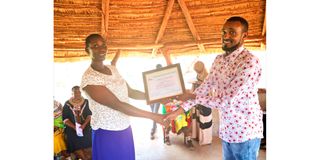Sacco powering women in 9 pastoral counties to financial freedom

Napolok Namunken receives a certificate after she emerged the best saver with Northern Rangelands Sacco for the year 2022 at an annual delegates meeting at Kalama community conservancy on April 26, 2023.
What you need to know:
- Unlike other pastoralist women who still grapple with limited access to and control of resources, Napolok is among a few women lucky to have been allowed by their husbands to start and run businesses.
- Due to patriarchy, pastoral women have mainly looking after livestock, fetching water and firewood, and cooking for their families.
Napolok Namunken, a businesswoman in Loruko village, Isiolo County, hardly lends anyone her phone to make a call and if she agrees to assist, you have to use your own Sim card.
The ‘caution’ habit was inculcated in her by her daughter Rhoda, who convinced her to start saving with a Sacco and shun keeping cash in the house.
“I do not allow anyone to touch my phone because they could defraud me or block my M-Pesa Pin. My daughter told me not to give out my phone,” she says.
Unlike other pastoralist women who still grapple with limited access to and control of resources, which remains the preserve of men, Napolok is among a few women lucky to have been allowed by their husbands to start and manage businesses.
Due to the patriarchal culture, pastoral women have mainly looking after livestock, fetching water and firewood, and cooking for their families.
The mother of seven, who has never set foot in a classroom, had, before agreeing to join Northern Rangelands Sacco, tried several banks but was ostensibly dissatisfied with what she terms sluggish growth of interest on her savings.
“I used to save [from my business] throughout the week and then take the money to the bank during the weekend, but the hassle is gone because I now deposit money into my Sacco account from my phone,” she shares.
A training by NRT-Trading’ Biashara programme exposed her to the benefit of Sacco loans, which she says have assisted her to grow her shop business and build resilience to harsh economic times occasioned by climatic shocks and Covid-19.
Motivation
Four years in the Sacco, she says, her savings culture has grown, with rising annual dividends continually motivating her to save more. “I got Sh17, 000, Sh32, 000 and Sh27, 000 dividends in 2019, 2020 and 2021 respectively,” elated Namuken told Nation.Africa during the Sacco’s Annual Delegates meeting in Kalama community conservancy, Samburu East, where Sh1.65 million dividends for last year are disbursed to members.
Surprisingly, the businesswoman was named the best saver for 2022 during the event, taking home Sh41,000 dividends, her highest ever.
NRT-T Senior Enterprise Development officer Elema Mohamud said 69 per cent of the Sacco formed by NRT community conservancy members are women, in deliberate efforts to inculcate a savings, borrowing and investment culture in the community, which has for a long time been marginalised.
“We offer tailored business and financial literacy training before processing loans because 90 per cent of the members have no formal education,” Mr Mohamud said.
Started in 2016, the Sacco, whose membership has grown from 200 to over 5000 over the years, provides an opportunity to members across 39 community conservancies in nine counties to grow their businesses and diversify their livelihoods for economic empowerment.
Ms Pauline Lolngojine, who previously chaired the Sacco’s board, said agents within the villages help members deposit money into their accounts and do not need to physically visit the offices.
“The Sacco has offered an alternative to banks, which are many kilometres away from the villages. An old woman is able to save at the comfort of her home,” she said.
Youths, she said, had also taken advantage of the opportunity to start businesses and shun harmful practices such as cattle rustling. Ms Leinte Ngesinoi, 62, popularly known as Mama Safaricom, is among the pioneer members and runs a successful goat business.
“I cannot lack food because the goat business is doing well. I buy many of them in the villages then take them to the Merille livestock market in Laisamis, Marsabit,” Leinte says, revealing that she had saved more than Sh60,000 in the last five years.
Philip Lesantanguny Sameti, 27, is also a beneficiary of Sacco loans, which have seen him establish several businesses in Lengusaka. “I scored a B (minus) in KCSE exam at Maralal High School in Samburu in 2015 and because my parents could not afford to take me to college, I opted to seek manual jobs at construction sites before later joining the Sacco,” he says.
A product dubbed Morans Loan, which he benefited from after seven months, offered him an incentive into joining the goat business, a venture he undertakes to date.
“I saved while I paid the loan and after a year, I opened up a general shop at Lengusaka market and years later, I opened a restaurant, which is doing well,” he tells Nation.Africa.
Mr Sameti makes an average of Sh40,000 profit from the two businesses in a month. “More youths should be reached out because teaching them how to save and invest will aid in addressing the cattle rustling menace,” he urges.





